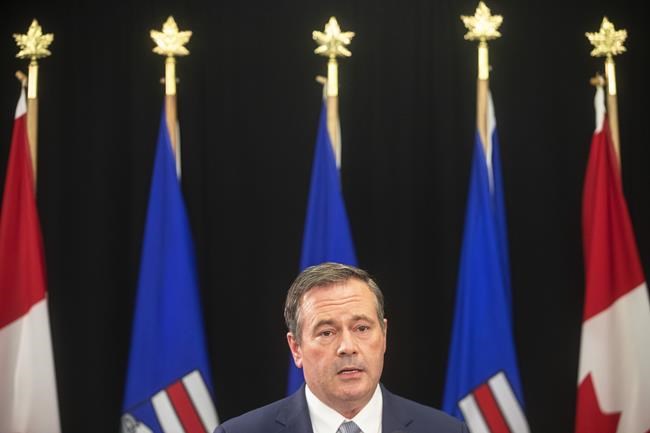Alberta set to vote on rejecting equalization, premier says it’s about leverage
Advertisement
Read this article for free:
or
Already have an account? Log in here »
To continue reading, please subscribe:
Monthly Digital Subscription
$0 for the first 4 weeks*
- Enjoy unlimited reading on winnipegfreepress.com
- Read the E-Edition, our digital replica newspaper
- Access News Break, our award-winning app
- Play interactive puzzles
*No charge for 4 weeks then price increases to the regular rate of $19.00 plus GST every four weeks. Offer available to new and qualified returning subscribers only. Cancel any time.
Monthly Digital Subscription
$4.75/week*
- Enjoy unlimited reading on winnipegfreepress.com
- Read the E-Edition, our digital replica newspaper
- Access News Break, our award-winning app
- Play interactive puzzles
*Billed as $19 plus GST every four weeks. Cancel any time.
To continue reading, please subscribe:
Add Free Press access to your Brandon Sun subscription for only an additional
$1 for the first 4 weeks*
*Your next subscription payment will increase by $1.00 and you will be charged $16.99 plus GST for four weeks. After four weeks, your payment will increase to $23.99 plus GST every four weeks.
Read unlimited articles for free today:
or
Already have an account? Log in here »
Hey there, time traveller!
This article was published 17/10/2021 (1516 days ago), so information in it may no longer be current.
EDMONTON – Albertans will cast ballots Monday in a referendum that is technically about rejecting equalization but has morphed into more of a Prairie festivus airing of grievances.
“(This) is not about partisan politics,” Premier Jason Kenney has said at various times in recent days, when asked about the referendum question.
“This is about whether or not Alberta should push hard to get a fair deal.”

It’s symbolism, he said, but also a bargaining chip.
“The point of it is to get leverage for constitutional negotiations with the federal government about reform of the entire system of fiscal federalism, which treats Alberta so unfairly,” he said.
The question is straightforward for voters, who are also heading to the polls in municipal elections: Should the section of the Constitution enshrining the principle of equalization payments be removed?
Equalization sees some tax money collected by the federal government redistributed from wealthier provinces to lower-income ones to ensure a basic level of service for all.
Kenney has said Alberta has concerns over billions of dollars its residents pay, while provinces such as British Columbia and Quebec obstruct oil and pipeline projects that underpin that wealth.
Alberta Finance Minister Travis Toews estimated the provincial contribution at $20 billion a year in a public letter this week. It was signposted by the phrases “more unfair,” “clearly unfair,” “fundamentally unfair,” “lack of fairness” and “fight for fairness.”
Political scientist Jared Wesley, the lead on a recent University of Alberta survey on referendum voting intentions, said the poll suggested the Yes side remains in the lead. But he said a disturbingly high percentage doesn’t understand how equalization works (44 per cent), wrongly believes Quebec gets the most per capita (85 per cent), and fails to understand Ottawa does not need provincial buy-in to change the equalization formula (62 per cent).
“I don’t blame Albertans for being confused,” said Wesley. “They’ve been fed a lot of misinformation by governments in this province for a lot of decades, and that’s showing up in our research.”
Wesley said it’s a muddy referendum question designed to deliver “strategic ambiguity” for the United Conservative government as it seeks broad leverage.
But leverage, he said, is not what you think you have. Rather, it’s what others think you have.
He said the rest of Canada is seeing a province that has received generous federal COVID-19 funding, has called in the military to rescue its COVID-19-ravaged health system, and has seen Ottawa literally buy the Trans Mountain pipeline to help its oil industry.
“As much as the premier and Yes supporters are out there saying, ‘we want a fair deal,’ the rest of Canada doesn’t look at it that way,” said Wesley.
“I’ve called this the festivus referendum,” he added, referencing the fictive secular holiday made famous in the TV sitcom “Seinfeld,” when family members gather around a metal pole to swap festering complaints.
Bill Bewick, head of Fairness Alberta, a group stumping for a Yes vote, said critics confuse the message being sent with the more important principle of sending a message.
He said equalization is profoundly unfair to Alberta and that a referendum is a legal, practical, effective method for Albertans to get Ottawa’s attention while providing a handy release valve for those who would otherwise seek more radical alternatives to make their voices heard.
“(The vote) is people speaking and expressing their displeasure.”
Bewick said a Yes vote from Alberta could push other provinces to pressure the federal government for meaningful changes to improve the equalization formula for all.
“It can get the ball rolling,” he said.
Some Yes supporters, including ousted UCP backbencher Drew Barnes, worry that with Kenney’s low popularity numbers the No vote will get a boost from those who want to send a message to the premier.
“There is no question that the premier has failed our province on a variety of issues,” wrote Barnes in an open letter on social media.
“He is the least popular premier in Canada for good reason. However, on Oct. 18th I would encourage Albertans to focus on the bigger picture.”
University of Calgary economist Trevor Tombe, who has taken the No side in recent debates with Bewick, said Alberta already has the power to discuss its equalization concerns with Ottawa.
But he said the referendum question — on its face — is a dismaying rejection of long-held Alberta values toward fellow Canadians.
“Alberta (through its government) has always and consistently supported the principle of equalization,” said Tombe.
“It’s unfortunate that Kenney is asking us to reject it.”
This report by The Canadian Press was first published Oct. 17, 2021


